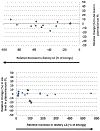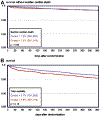Fatty acids in cardiovascular health and disease: a comprehensive update
- PMID: 22658146
- PMCID: PMC9398216
- DOI: 10.1016/j.jacl.2012.04.077
Fatty acids in cardiovascular health and disease: a comprehensive update
Abstract
Research dating back to the 1950s reported an association between the consumption of saturated fatty acids (SFAs) and risk of coronary heart disease. Recent epidemiological evidence, however, challenges these findings. It is well accepted that the consumption of SFAs increases low-density lipoprotein cholesterol (LDL-C), whereas carbohydrates, monounsaturated fatty acids (MUFAs), and polyunsaturated fatty acids (PUFAs) do not. High-density lipoprotein (HDL)-C increases with SFA intake. Among individuals who are insulin resistant, a low-fat, high-carbohydrate diet typically has an adverse effect on lipid profiles (in addition to decreasing HDL-C, it also increases triglyceride and LDL particle concentrations). Consequently, a moderate fat diet in which unsaturated fatty acids replace SFAs and carbohydrates are not augmented is advised to lower LDL-C; compared with a low-fat diet, a moderate-fat diet will lower triglycerides and increase HDL-C. Now, there is some new evidence that is questioning the health benefits of even MUFAs and PUFAs. In addition, in a few recent studies investigators have also failed to demonstrate expected cardiovascular benefits of marine-derived omega-3 fatty acids. To clarify the clinical pros and cons of dietary fats, the National Lipid Association held a fatty acid symposium at the 2011 National Lipid Association Scientific Sessions. During these sessions, the science regarding the effects of different fatty acid classes on coronary heart disease risk was reviewed.
Copyright © 2012 National Lipid Association. Published by Elsevier Inc. All rights reserved.
Figures









Similar articles
-
Randomized clinical trials on the effects of dietary fat and carbohydrate on plasma lipoproteins and cardiovascular disease.Am J Med. 2002 Dec 30;113 Suppl 9B:13S-24S. doi: 10.1016/s0002-9343(01)00987-1. Am J Med. 2002. PMID: 12566134 Review.
-
Replacement of saturated with unsaturated fats had no impact on vascular function but beneficial effects on lipid biomarkers, E-selectin, and blood pressure: results from the randomized, controlled Dietary Intervention and VAScular function (DIVAS) study.Am J Clin Nutr. 2015 Jul;102(1):40-8. doi: 10.3945/ajcn.114.097089. Epub 2015 May 27. Am J Clin Nutr. 2015. PMID: 26016869 Clinical Trial.
-
Emerging nutrition science on fatty acids and cardiovascular disease: nutritionists' perspectives.Adv Nutr. 2015 May 15;6(3):326S-37S. doi: 10.3945/an.114.006981. Print 2015 May. Adv Nutr. 2015. PMID: 25979506 Free PMC article. Review.
-
Comparison of the impact of SFAs from cheese and butter on cardiometabolic risk factors: a randomized controlled trial.Am J Clin Nutr. 2017 Apr;105(4):800-809. doi: 10.3945/ajcn.116.150300. Epub 2017 Mar 1. Am J Clin Nutr. 2017. PMID: 28251937 Clinical Trial.
-
Associations of Dietary Intake with Cardiovascular Risk in Long-Term "Plant-Based Eaters": A Secondary Analysis of a Cross-Sectional Study.Nutrients. 2024 Mar 11;16(6):796. doi: 10.3390/nu16060796. Nutrients. 2024. PMID: 38542706 Free PMC article.
Cited by
-
Exploitable Lipids and Fatty Acids in the Invasive Oyster Crassostrea gigas on the French Atlantic Coast.Mar Drugs. 2016 May 24;14(6):104. doi: 10.3390/md14060104. Mar Drugs. 2016. PMID: 27231919 Free PMC article.
-
Cardiac physiology and clinical efficacy of dietary fish oil clarified through cellular mechanisms of omega-3 polyunsaturated fatty acids.Eur J Appl Physiol. 2014;114(7):1333-56. doi: 10.1007/s00421-014-2876-z. Epub 2014 Apr 4. Eur J Appl Physiol. 2014. PMID: 24699892 Review.
-
Effects of Consuming Repeatedly Heated Edible Oils on Cardiovascular Diseases: A Narrative Review.Curr Med Chem. 2024;31(40):6630-6648. doi: 10.2174/0109298673250752230921090452. Curr Med Chem. 2024. PMID: 37877148 Review.
-
Role of serotonin in fatty acid-induced non-alcoholic fatty liver disease in mice.BMC Gastroenterol. 2013 Dec 9;13:169. doi: 10.1186/1471-230X-13-169. BMC Gastroenterol. 2013. PMID: 24321090 Free PMC article.
-
Acute consumption of a high-fat diet prior to ischemia-reperfusion results in cardioprotection through NF-κB-dependent regulation of autophagic pathways.Am J Physiol Heart Circ Physiol. 2014 Dec 15;307(12):H1705-13. doi: 10.1152/ajpheart.00271.2014. Epub 2014 Sep 19. Am J Physiol Heart Circ Physiol. 2014. PMID: 25239807 Free PMC article.
References
-
- Mu H, Hoy CE. The digestion of dietary triacylglycerols. Prog Lipid Res. 2004;43:105–133. - PubMed
-
- IUPAC-IUB Commission on Biochemical Nomenclature (CBN). The nomenclature of lipids (recommendations 1976). Eur J Biochem. 1977;79:11–21.
-
- Russo GL. Dietary n-6 and n-3 polyunsaturated fatty acids: from biochemistry to clinical implications in cardiovascular prevention. Biochem Pharmacol. 2009;77:937–946. - PubMed
-
- Brenna JT, Salem N Jr., Sinclair AJ, Cunnane SC. International Society for the Study of Fatty Acids and Lipids (ISSFAL). Alpha-linolenic acid supplementation and conversion to n-3 long-chain polyunsaturated fatty acids in humans. Prostaglandins Leukot Essent Fatty Acids. 2009;80:85–91. - PubMed
Publication types
MeSH terms
Substances
Grants and funding
LinkOut - more resources
Full Text Sources
Other Literature Sources
Miscellaneous

